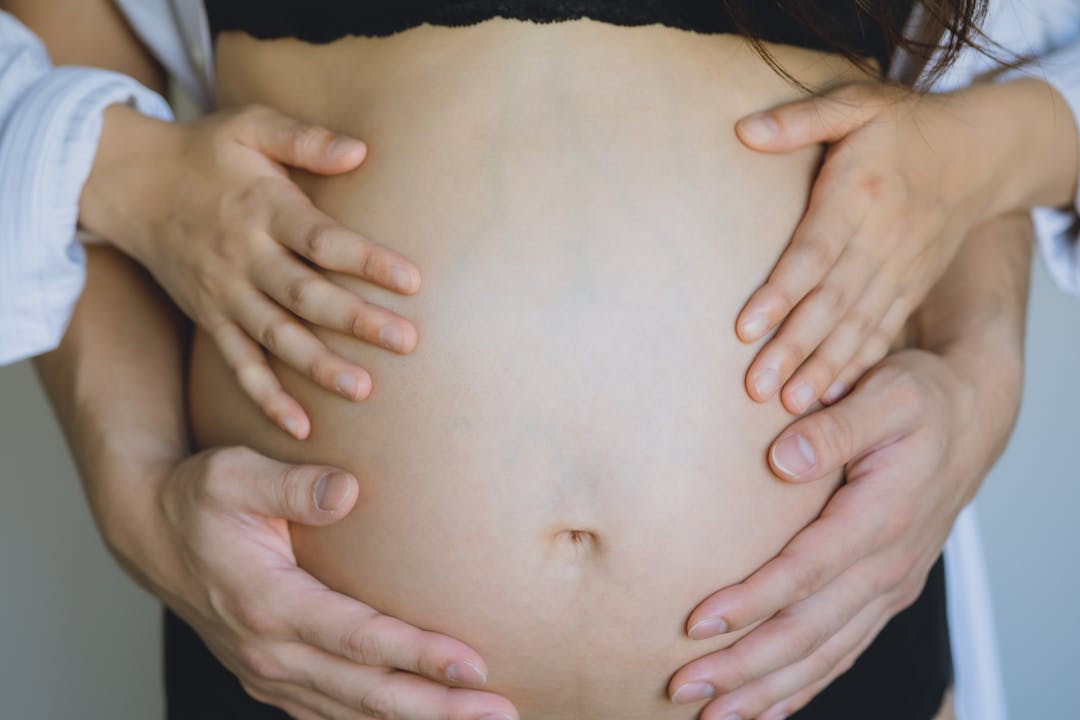Do you have a human brain or an ancient amphibian brain? If you've hiccuped even once in your life, your brain might be less human than you think. Scientists believe that hiccups are a holdover from humanity's ancient transition from the swamps to the land—ribbit!
It makes sense that your sweet baby, snuggled up in the watery world of your womb, might hiccup, too. Fetal hiccups are a normal part of a new baby's development. They may even mean that your precious baby has developed all the reflexes it needs to thrive outside your tummy.
We've created this guide to help explain this strange fetal phenomenon. We'll discuss what causes fetal hiccups and what they can teach you about your new baby. You'll learn how to recognize the sensation and when you should contact a doctor with concerns.
Read on to explore the ins and outs of fetal hiccups during pregnancy.
What Are Fetal Hiccups?
We bet you can't remember learning to breathe, let alone needing to practice to get it right. Babies are brand new people, and as their tiny lungs develop, they must learn to use them. Often, breathing practice begins right in your womb.
Your womb isn't full of air, however. Each time your sweet baby takes a "practice breath," they take in some amniotic fluid. Luckily, humans have nifty, built-in reflexes to prevent choking or aspiration.
Fetal hiccups are the result of this process.
What Causes Hiccups in the Womb?
Some of these reflexes kick in—even while your new baby is still in utero. Each time your baby takes a breath of amniotic fluid, their diaphragm contracts to prevent aspiration. It's essentially the same reflex that fires when any human has a case of hiccups.
Thus, fetal hiccups indicate that your baby's developing brain and body are doing their job.
How Can You Tell if Your Baby Is Hiccupping in the Womb?
Fetal hiccupping is a quick, repetitive feeling that many new moms mistake for a kick or jab. The sensation will happen several times in a consistent location, in a fairly predictable sequence. A fetal hiccup rhythm is not dissimilar to the rhythm of adult hiccups.
Your baby's diaphragm develops as early as the first trimester. Babies usually hiccup for the first time when they've been in the womb for ten weeks. Moms can sometimes observe baby hiccups on a sonogram long before they can feel them.
Most moms-to-be feel their first case of fetal hiccups during the third trimester.
Are Fetal Hiccups During Pregnancy a Good Thing?
More often than not, fetal hiccups signify that your sweet baby is preparing to make its arrival. They are the result of meeting several significant developmental milestones. They're often a sign that your little one is "cooked" enough to enter the world.
One exciting milestone is the development of the nervous system, which is responsible for producing reflexes like the hiccupping reflex. A hiccupping baby is a baby whose brain and spinal cord are developing nicely. That means they have the mechanisms down to help them thrive in the world outside your tummy.
While hiccups are usually the result of "breathing practice," they may also result from other adorable fetal behaviors. A yawn can just as easily cause the hiccup reflex to kick in. Sometimes thumb-sucking or suckling practice cause hiccups, too.
Most importantly, your baby's ability to breathe and their diaphragm's ability to contract prove that their organ systems are developing nicely. Good job, Mama!
Fetal Hiccups and When to Worry
Some new moms worry that their baby is hiccupping too much or not enough.
There is no "right amount" to be hiccuping in the womb. All babies are individuals. Some are hiccupping champions, while others are quieter.
If you're tracking your baby's movement, don't count hiccups in your tally. Tracking is how some new parents become concerned. As long as your baby is moving and kicking, you shouldn't worry about the frequency of their hiccups.
Babies tend to hiccup frequently for a while, and you might get used to their habits and patterns. It's normal for babies to hiccup less as you approach your due date. If those familiar patterns seem like they've changed, it's not likely a cause for concern.
Hiccups may be a reason to consult your physician in one particular instance. If your baby's hiccups become more frequent as you get closer to giving birth, there may be an issue with your umbilical cord. It's always safer to check in with your doctor if you have any concerns.
Ultimately, fetal hiccups are rarely a problem, but you know your baby and body best. Always contact a medical professional if something doesn't feel right. It's their job to answer your questions and provide peace of mind before and after you welcome your baby into the world.
With Pixsee, Peace of Mind Is Not a Hiccup
Hiccups are hiccups, whether you're an adult who has swallowed air too quickly or a fetal infant using their lungs for the first time. Fetal hiccups mean your sweet baby is developing the organ systems and skills they need to survive beyond the womb. When you feel hiccups, you should get excited—your little one's on the way!
Once they're here, you won't want to miss a single hiccup, smile, grimace, or giggle. With the Pixsee smart video baby monitor, you won't have to. Visit our Pixsee Shop and Amazon online store to learn how Pixsee can help you document your sweet baby's growth journey without missing a single hiccup.







